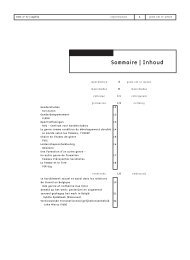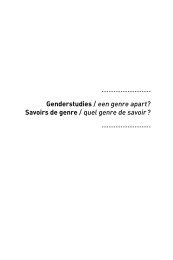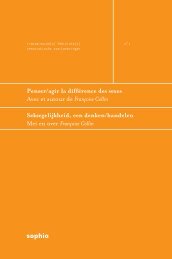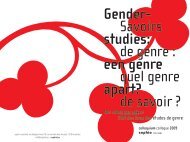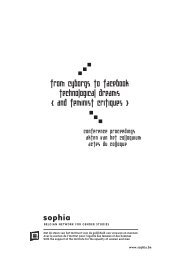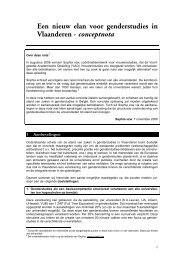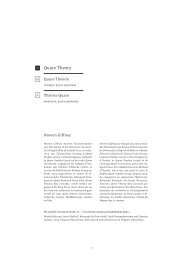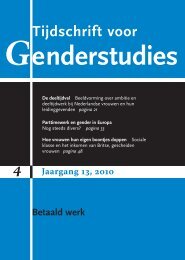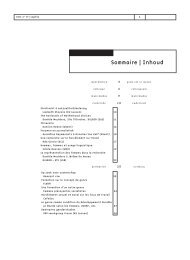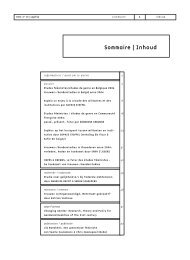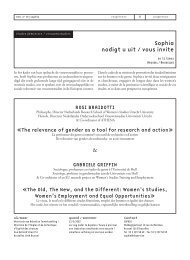Nieuwsbrief 39 (pdf) - Sophia
Nieuwsbrief 39 (pdf) - Sophia
Nieuwsbrief 39 (pdf) - Sophia
You also want an ePaper? Increase the reach of your titles
YUMPU automatically turns print PDFs into web optimized ePapers that Google loves.
dossier 26 dossier<br />
sophia | n° <strong>39</strong> | 2004<br />
hand there are also female newcomers<br />
who intend to devote themselves entirely<br />
to their role as housewife and who do<br />
not consider work outside the home an<br />
option.<br />
It emerged from the interviews that the<br />
expectations of women with regard to<br />
work sometimes clash with the expectations<br />
of their husbands. While the male<br />
often hopes to marry a 'traditional housewife'<br />
by choosing a partner from their<br />
country of origin, the female newcomer<br />
expects to achieve emancipation by marrying<br />
a Flemish- Turkish/Moroccan partner.<br />
In other words, the myths that circulate<br />
about the two communities are a<br />
constant source of conflict between many<br />
newly-weds.<br />
Both men and women complain that finding<br />
a job in Flanders is much harder<br />
than they had imagined. Again, this is<br />
indicative of a myth in Turkey and<br />
Morocco about employment in Europe.<br />
Migrants assume that they will find work<br />
immediately, without the required language<br />
skills. To many men, this was their<br />
biggest disappointment in Flemish society,<br />
as the failure to find employment had<br />
immediate and tangible financial consequences.<br />
Most newcomers, however, have no specific<br />
conception of Belgium and Flanders<br />
in particular. They have an image of<br />
'Europe', which is shaped by migrants<br />
who return home for their summer holidays.<br />
It had become quite clear to the<br />
Turkish newcomers participating in our<br />
research that this image was a distorted<br />
view of the European lifestyle.<br />
Furthermore, newcomers had heard stories<br />
about the prevailing Flemish mentality<br />
from their prospective spouses. They<br />
had been told about positive values such<br />
as tolerance, and negative aspects such as<br />
individualism. Almost all newcomers spoke<br />
positively about the considerable<br />
degree of (political) freedom in Belgium.<br />
However, they also indicated that they<br />
had been warned that the Turkish/Moroccan<br />
community in Flanders was quite<br />
individualistic and showed little solidarity.<br />
3.5. Reception Policy<br />
Few newcomers were aware before they<br />
left their homelands that Flanders has a<br />
reception policy. They had counted mostly<br />
on support from their partners and inlaws.<br />
Most female newcomers said explicitly<br />
that it was up to their partner, who<br />
had after all been raised in Flanders, to<br />
assist them. This expectation was less outspoken<br />
among the male newcomers. They<br />
counted on support and solidarity on the<br />
part of their community in Belgium, but<br />
this expectation was rarely fulfilled.<br />
Both male and female newcomers had a<br />
positive attitude towards the official reception<br />
policy of the centres visited. Most<br />
said they were pleasantly surprised when<br />
they were told such facilities existed.<br />
Moreover, the courses more than fulfilled<br />
their expectations, so that they found it<br />
difficult to formulate any points of criticism.<br />
Most respondents did however indicate<br />
they had intended to start a course<br />
in "Dutch as a foreign language" sooner,<br />
but that they had lost time because of the<br />
existing waiting list. This feeling was even<br />
more pronounced among the men, who<br />
were for that matter slightly more critical<br />
of such courses, as they interfered with<br />
their urgent desire to find a job. Many<br />
males indicated that they had left their<br />
homeland in the hope of finding immediate<br />
employment. They therefore felt<br />
frustrated first to have to attend 'school',<br />
especially without any guarantee of subsequent<br />
employment. For newcomers<br />
who want to work, it would probably be<br />
interesting if the vocational training offered<br />
by the employment agency (VDAB)<br />
would be combined with a language course<br />
and a social orientation programme.<br />
Higher-skilled men were also more critical:<br />
they felt the courses were not always<br />
adapted to their abilities. It was unclear<br />
what added value a social orientation programme<br />
might represent to them.<br />
3.6. Participation in associations<br />
Few newcomers are members of Flemish-<br />
Turkish/Moroccan associations or clubs.<br />
It did however emerge that there was a<br />
need in this respect among the newcomers<br />
interviewed. The impression was<br />
created that the Turkish community, or<br />
certain segments of it, may be better organised<br />
for the reception of newcomers than<br />
the Moroccan community. Some Turkish<br />
organisations even provide Dutch<br />
language courses. Associations for women<br />
also seem better organised within the Turkish<br />
community.<br />
Over half of the respondents had relatives<br />
who were already living in Belgium.<br />
They all counted on their active assistance<br />
in facilitating their 'integration'. In<br />
reality, however, most had been disappointed<br />
and they complained about a<br />
lack of help and interest on the part of the<br />
community in the situation of newcomers.<br />
They experienced this as a lack of<br />
solidarity. Conversely, their community<br />
often looks down on newcomers because<br />
they come from the 'backward' home<br />
country. The newcomer, on the other<br />
hand, is often under the impression that<br />
time has stood still within the Flemish-<br />
Turkish/Moroccan community.<br />
In other words, there is little understanding<br />
between the two groups, which is<br />
particularly tough on male newcomers.<br />
After all, they often find themselves in a<br />
precarious economic situation. Moreover,<br />
they must often come to terms with<br />
the fact that the image of the 'rich<br />
migrant' is a myth. Female newcomers,<br />
on the other hand, tend to complain<br />
about the great loneliness to which they<br />
fall prey if they can only fall back on their<br />
husband. In this sense, the reception programme<br />
can also fulfil a therapeutic role<br />
for many people. After all, it provides an<br />
opportunity to come into contact with<br />
individuals facing a similar situation.<br />
Contact<br />
Steunpunt Gelijkekansenbeleid<br />
Katrien van der Haeyden,<br />
Prinsstraat 13, 2000 Antwerpen<br />
Tel +32 3 220 42 96 Fax +32 3 220 43 82<br />
steunpuntgeja@ua.ac.be<br />
www.steunpuntgelijkekansen.be




